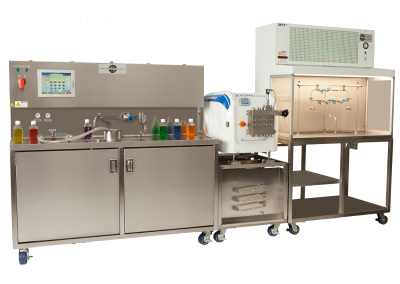In today’s rapidly evolving industrial landscape, the demand for precision and efficiency has never been higher. As manufacturers and producers strive to meet these demands, thermal processing services have become integral to ensuring high-quality outputs and optimizing production processes. Thermal processing involves the application of heat to materials to achieve desired physical and chemical changes, making it essential in various industries, from aerospace and automotive to food and pharmaceuticals. This blog explores the pivotal role of these services in modern manufacturing and production, highlighting their significance, applications, and best practices for maximizing their benefits.
Understanding Thermal Processing Services
Thermal processing services encompass a range of heat-based treatments used to alter the properties of materials and products. These services are designed to improve durability, performance, and overall quality. Here’s a closer look at their role and importance in contemporary manufacturing and production:
- Heat Treatment: One of the core aspects is heat treatment, which includes processes like annealing, quenching, and tempering. These treatments are used to enhance the mechanical properties of metals, such as hardness and tensile strength, crucial for applications in automotive, aerospace, and construction industries.
- Thermal Sterilization: In the food and pharmaceutical sectors, thermal sterilization is essential for ensuring product safety and extending shelf life. Techniques such as pasteurization and autoclaving are employed to eliminate harmful microorganisms, preserving the quality and safety of consumables.
- Material Curing: Curing processes, such as those used in the production of polymers and composites, involve applying heat to harden or set materials. This is particularly important in industries like automotive and aerospace, where materials need to meet strict performance standards.
- Vulcanization: This specific thermal processing technique is used primarily in the rubber industry to enhance the elasticity and strength of rubber products. It involves heating rubber with sulfur, creating cross-links between polymer chains and improving the material’s performance and durability.
Key Benefits of Thermal Processing Services
Utilizing the services offers several benefits that significantly impact manufacturing and production efficiency:
- Enhanced Material Properties: Heat treatments and curing processes can dramatically improve the physical properties of materials. For example, heat treatment can increase the hardness of steel, making it more suitable for high-stress applications, while curing can enhance the chemical resistance and durability of polymers.
- Improved Product Quality: Consistent and controlled thermal processing ensures that products meet stringent quality standards. By applying precise temperature control and monitoring, manufacturers can achieve uniform results and reduce defects in the final products.
- Increased Efficiency: Thermal processing can streamline production processes by reducing the need for post-processing adjustments. For example, proper heat treatment can minimize the need for rework or additional machining, thus saving time and resources.
- Safety and Compliance: In industries like food and pharmaceuticals, thermal processing is crucial for meeting safety and regulatory standards. Proper sterilization and pasteurization ensure that products are free from contaminants and safe for consumer use.
Best Practices for Maximizing Thermal Processing Services
To fully leverage the benefits, manufacturers should adhere to best practices that ensure optimal results:
- Select the Right Processing Method:
- Customization: Choose the thermal processing method that best suits your material and product requirements. For instance, different metals require specific heat treatments to achieve the desired properties.
- Expert Guidance: Consult with experts to determine the most effective thermal processing techniques for your specific application. This can help in selecting appropriate parameters and avoiding common pitfalls.
- Customization: Choose the thermal processing method that best suits your material and product requirements. For instance, different metals require specific heat treatments to achieve the desired properties.
- Ensure Precise Temperature Control:
- Accuracy: Implement advanced temperature control systems to maintain precise heating and cooling rates. Accurate temperature management is crucial for achieving consistent material properties and avoiding defects.
- Monitoring: Regularly calibrate and monitor thermal processing equipment to ensure it operates within the specified parameters and maintains the desired quality.
- Accuracy: Implement advanced temperature control systems to maintain precise heating and cooling rates. Accurate temperature management is crucial for achieving consistent material properties and avoiding defects.
- Focus on Quality Assurance:
- Testing: Conduct thorough testing and quality assurance checks on processed materials to verify that they meet required standards and specifications. This includes mechanical testing for metals and sterility testing for food and pharmaceuticals.
- Documentation: Maintain detailed records of thermal processing parameters, equipment settings, and inspection results. This documentation is essential for traceability and quality control.
- Testing: Conduct thorough testing and quality assurance checks on processed materials to verify that they meet required standards and specifications. This includes mechanical testing for metals and sterility testing for food and pharmaceuticals.
- Invest in Modern Technology:
- Upgrades: Invest in the latest thermal processing technology and equipment to enhance efficiency and precision. Modern systems offer advanced features like automated controls and real-time monitoring, improving overall performance.
- Training: Provide training for personnel to ensure they are proficient in operating and maintaining thermal processing equipment. Well-trained staff can effectively manage processes and troubleshoot issues as they arise.
- Upgrades: Invest in the latest thermal processing technology and equipment to enhance efficiency and precision. Modern systems offer advanced features like automated controls and real-time monitoring, improving overall performance.
Crucial Role
Thermal processing services play a crucial role in modern manufacturing and production by enhancing material properties, ensuring product quality, and improving operational efficiency. From heat treatments and sterilization to curing and vulcanization, these services are essential for meeting industry standards and consumer expectations. By understanding the benefits and adhering to best practices, manufacturers can optimize their use leading to better products, increased productivity, and a competitive edge in the market.
